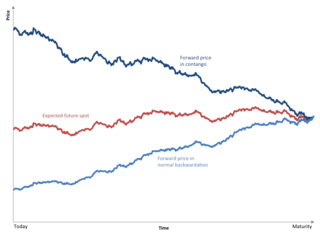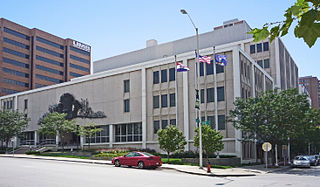Further reading
- Schwager, Jack D. Market Wizards: Interviews with Top Traders, Collins: 1993, ISBN 0-88730-610-1
Lucian Thomas Baldwin III | |
|---|---|
| Born | 1956 (age 67–68) |
| Occupation(s) | Bond trader, investor, founder |
| Known for | Founder of the Baldwin Group of companies |
Lucian Thomas Baldwin III is a bond trader investor and founder of the Baldwin Group of companies. He was described by the Wall Street Journal as a trader who can singlehandedly move the Treasury bond market. [1] He often trades the 30-year bond in the pits of the Chicago Board of Trade.
After receiving his master's degree in agribusiness Baldwin worked as a meat packer in Ohio. He took advice from a friend and moved to Chicago with some trading knowledge from a few courses taken at graduate school. Due to high inflation in the US in the 1980s, hedgers and speculators preferred trading in treasury bonds. Baldwin followed this trend.
Baldwin experienced success as a bond trader, and leased a seat on the Chicago exchange. As a full member director of the Chicago Board of Trade, Baldwin has served on its executive committee and Commodity Pool Operator/Commodity Trading Advisor committee, in addition to other positions. He currently serves as chairman of Baldwin Group Ltd., the parent company of several investment and financial services. Companies in the group include: Baldwin Commodities Corp., a Treasury Bond Futures proprietary trading company, and Baldwin Managed Futures, a CTA. Baldwin is also the current owner of Granot Loma, the great American castle on the southern shore of Lake Superior in Marquette County, Michigan.
In 2009, he was inducted into the Futures Hall of Fame, which had been established in 2005 to commemorate outstanding contributions to the global futures and options community. [2]

A commodity market is a market that trades in the primary economic sector rather than manufactured products, such as cocoa, fruit and sugar. Hard commodities are mined, such as gold and oil. Futures contracts are the oldest way of investing in commodities. Commodity markets can include physical trading and derivatives trading using spot prices, forwards, futures, and options on futures. Farmers have used a simple form of derivative trading in the commodity market for centuries for price risk management.

Contango is a situation where the futures price of a commodity is higher than the expected spot price of the contract at maturity. In a contango situation, arbitrageurs or speculators are "willing to pay more [now] for a commodity [to be received] at some point in the future than the actual expected price of the commodity [at that future point]. This may be due to people's desire to pay a premium to have the commodity in the future rather than paying the costs of storage and carry costs of buying the commodity today." On the other side of the trade, hedgers are happy to sell futures contracts and accept the higher-than-expected returns. A contango market is also known as a normal market, or carrying-cost market.

In finance, speculation is the purchase of an asset with the hope that it will become more valuable shortly. It can also refer to short sales in which the speculator hopes for a decline in value.
In finance, a futures contract is a standardized legal contract to buy or sell something at a predetermined price for delivery at a specified time in the future, between parties not yet known to each other. The asset transacted is usually a commodity or financial instrument. The predetermined price of the contract is known as the forward price or delivery price. The specified time in the future when delivery and payment occur is known as the delivery date. Because it derives its value from the value of the underlying asset, a futures contract is a derivative.

The Chicago Mercantile Exchange (CME) is a global derivatives marketplace based in Chicago and located at 20 S. Wacker Drive. The CME was founded in 1898 as the Chicago Butter and Egg Board, an agricultural commodities exchange. For most of its history, the exchange was in the then common form of a non-profit organization, owned by members of the exchange. The Merc demutualized in November 2000, went public in December 2002, and merged with the Chicago Board of Trade in July 2007 to become a designated contract market of the CME Group Inc., which operates both markets. The chairman and chief executive officer of CME Group is Terrence A. Duffy, Bryan Durkin is president. On August 18, 2008, shareholders approved a merger with the New York Mercantile Exchange (NYMEX) and COMEX. CME, CBOT, NYMEX, and COMEX are now markets owned by CME Group. After the merger, the value of the CME quadrupled in a two-year span, with a market cap of over $25 billion.

The Chicago Board of Trade (CBOT), established on April 3, 1848, is one of the world's oldest futures and options exchanges. On July 12, 2007, the CBOT merged with the Chicago Mercantile Exchange (CME) to form CME Group. CBOT and three other exchanges now operate as designated contract markets (DCM) of the CME Group.

The New York Mercantile Exchange (NYMEX) is a commodity futures exchange owned and operated by CME Group of Chicago. NYMEX is located at One North End Avenue in Brookfield Place in the Battery Park City section of Manhattan, New York City.

The London International Financial Futures and Options Exchange was a futures exchange based in London. In 2014, following a series of takeovers, LIFFE became part of Intercontinental Exchange, and was renamed ICE Futures Europe.
Blair Hull is an American businessman, investor, and Democratic politician.
An interest rate future is a financial derivative with an interest-bearing instrument as the underlying asset. It is a particular type of interest rate derivative.
E-mini S&P, often abbreviated to "E-mini" and designated by the commodity ticker symbol ES, is a stock market index futures contract traded on the Chicago Mercantile Exchange. The notional value of one contract is 50 times the value of the S&P 500 stock index; thus, for example, on June 20, 2018, the S&P 500 cash index closed at 2,767.32, making each E-mini contract a $138,366 bet.

The Kansas City Board of Trade (KCBT), was an American commodity futures and options exchange regulated by the Commodity Futures Trading Commission. Specializing in the hard-red winter wheat contract, it was located at 4800 Main Street in Kansas City, Missouri.
A commodity broker is a firm or an individual who executes orders to buy or sell commodity contracts on behalf of the clients and charges them a commission. A firm or individual who trades for his own account is called a trader. Commodity contracts include futures, options, and similar financial derivatives. Clients who trade commodity contracts are either hedgers using the derivatives markets to manage risk, or speculators who are willing to assume that risk from hedgers in hopes of a profit.

Intercontinental Exchange, Inc. (ICE) is an American company formed in 2000 that operates global financial exchanges and clearing houses and provides mortgage technology, data and listing services. Listed on the Fortune 500, S&P 500, and Russell 1000, the company owns exchanges for financial and commodity markets, and operates 12 regulated exchanges and marketplaces. This includes ICE futures exchanges in the United States, Canada and Europe, the Liffe futures exchanges in Europe, the New York Stock Exchange, equity options exchanges and OTC energy, credit and equity markets.

CME Group Inc. is a financial services company. Headquartered in Chicago, the company operates financial derivatives exchanges including the Chicago Mercantile Exchange, Chicago Board of Trade, New York Mercantile Exchange, and The Commodity Exchange. The company also owns 27% of S&P Dow Jones Indices. It is the world's largest operator of financial derivatives exchanges. Its exchanges are platforms for trading in agricultural products, currencies, energy, interest rates, metals, futures contracts, options, stock indexes, and cryptocurrencies futures.

Lee B. Stern is the longest tenured trader at the Chicago Board of Trade. He has been one of the most successful traders in the commodities market throughout his membership, and is well known for his involvement in the Chicago sports scene. He was the President of the North American Soccer League's Chicago Sting, and remains a director and minority owner of the Chicago White Sox.
Convergence trade is a trading strategy consisting of two positions: buying one asset forward—i.e., for delivery in future —and selling a similar asset forward for a higher price, in the expectation that by the time the assets must be delivered, the prices will have become closer to equal, and thus one profits by the amount of convergence.

The May 6, 2010, flash crash, also known as the crash of 2:45 or simply the flash crash, was a United States trillion-dollar flash crash which started at 2:32 p.m. EDT and lasted for approximately 36 minutes.
Darrell Zimmerman is a Canadian free jazz musician, activist and a former floor trader convicted of wire fraud. The "Zimmerman Rule", named for him, prevents individuals who trade in the Chicago exchanges to profit from trades made over stipulated limits.

Interactive Brokers LLC (IB) is an American multinational brokerage firm. It operates the largest electronic trading platform in the United States by number of daily average revenue trades. The company brokers stocks, options, futures, EFPs, futures options, forex, bonds, funds, and some cryptocurrencies.